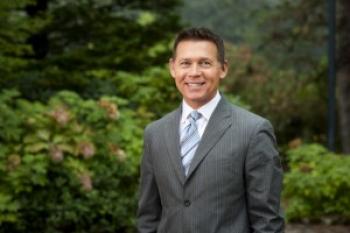New YDS Director of Communications Tom Krattenmaker loves to monitor the formidable, shifting dramas of religion in public life—its conflicts, dilemmas, and potential for enriching the common good.
In such a heady climate, his new work will be to promote YDS endeavor and news so that the school’s values help shape the future of religious and public purpose.
 “I’m optimistic that some kind of fascinating future is being written now, and YDS is positioned to help create it,” he says. “What I sense here is not fear but opportunity.”
“I’m optimistic that some kind of fascinating future is being written now, and YDS is positioned to help create it,” he says. “What I sense here is not fear but opportunity.”
Beyond one-dimensional stereotypes
Krattenmaker brings unusual dual-track experience to the new YDS position. He has worked 25 years in university communications, most recently at Lewis & Clark College in Portland, Oregon. He is also a nationally known religion writer and commentator—a regular columnist for USA Today and the author of two books on evangelical life.
He describes himself as sympathetic to all sorts of religious expression but doesn’t claim any affiliation.
“Sometimes I call myself a faith-positive nonparticipant or something like that,” he says. “Now there’s a new term I’m starting to use for myself—‘secular Jesus follower.’ The idea being: How can a religion nonparticipant still build an ethical life around the teachings and example of Jesus?”
His writing has allowed him to satisfy a deep curiosity about various threads of religious belief and its application to public life. His 2009 book, Onward Christian Athletes: Turning Ballparks into Pulpits and Players into Preachers (Rowman & Littlefield), critiques the efforts of evangelical Christians to increase their leverage within the culture of pro sports.
His latest, The Evangelicals You Don’t Know: Introducing the Next Generation of Christians (Rowman & Littlefield, 2013), makes the case that the world of evangelical Protestants is more diverse and in many cases more progressive and conciliatory than the one-dimensional stereotype suggests.
Lately, his writing has turned to a rather different religious subject. “I’m super curious about what’s happening with agnostics and atheists and ‘nones,’” he says.
“As I hear them, it’s less about bashing religion now and more about making their own arguments for morality and ethics. They’re fighting for a place at the table. They too want to be seen as good and conscientious citizens.”
Common good and comfort zones
Behind Krattenmaker’s interest in religion lies a deep concern for empathy, which he finds in short supply in today’s partisan landscape. In the history and mission of Yale Divinity School, he finds core Christian values that our culture needs if it is going to cultivate the common good.
“YDS represents very important habits of mind—open-mindedness, critical thinking, inclusiveness and fairness, convictions about Christianity that emphasize compassion, love, and justice.
“If our society is going to pursue the common good, we have to leave our silos, our partisan comfort zones, and get to know each other again. These days, the spotlight goes to the loudest voice, and being reasonable hasn’t been cool. But ideological divisions and harsh rhetoric are hurting our country and impoverishing our society.
“The common good is not about vanquishing the enemy or winning the culture war. It’s about nobody getting left behind. Pursuing it does not require that we totally embrace the other side but, instead, find out how many commitments we might share. In my experience there’s always potential for partnerships and coalitions for pragmatic reform.”
An unfolding world of new faith expressions
Raised in the Twin Cities, Krattenmaker has a B.A. in journalism from the University of Minnesota (1983) and an M.A. in religion and public life from the University of Pennsylvania (2004). He worked as a reporter in the 1980s for the Orange County Register in California and the Associated Press. He then moved to communications and public relations in university settings—as a senior writer at Princeton University (1990-1995), public relations director of Swarthmore College (1995-2006), and associate vice president for public affairs and communications at Lewis & Clark College (from 2006 until he came to New Haven this fall).
He was first drawn to religion as a young reporter. His first impressions weren’t good, especially regarding evangelicalism.
“What first drew me were the controversies, and I was disturbed by the dubious application of faith to politics and policy. For me, this really came to the fore in the run-up to the Iraq war.”
But his mid-career M.A. work at Penn opened his mind to an unfolding world of new faith expressions and exposed his own biases. Moving to Portland for the Lewis & Clark job was revelatory too. There he found a rising generation of new millennium evangelicals taking up the fight against poverty, human trafficking, and dubious practices and belief within their own evangelical communities.
Religion in America was changing, he discovered. These are themes he writes about in many of his USA Today columns (see tomkrattenmaker.com).
“Coming to Portland in 2006, I discovered it was the epicenter of a new evangelicalism and I came to understand these Christians and their beliefs better. I see why they believe what they believe.”
The current landscape, he says, puts YDS in an exciting, crucial place in time—a Christian school with a long history of ministerial leadership, theological alertness, and engagement with the currents of culture. People are looking to it for answers and interpretations during this rising post-modern moment.
“We’re in a time of fluid categories and identities. There’s confusion but also lots of potential for hope. Dean Greg Sterling really has his eye on the future and our potential to shape it at YDS. What a fascinating opportunity and what a great story to tell.”
| Attachment | Size |
|---|---|
| 17.09 KB |